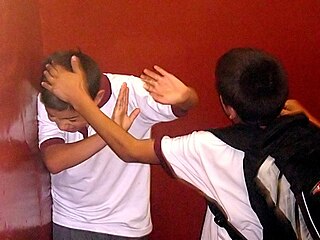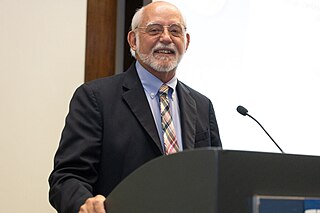
A mental disorder is an impairment of the mind disrupting normal thinking, feeling, mood, behavior, or social interactions, and accompanied by significant distress or dysfunction. The causes of mental disorders are very complex and vary depending on the particular disorder and the individual. Although the causes of most mental disorders are not fully understood, researchers have identified a variety of biological, psychological, and environmental factors that can contribute to the development or progression of mental disorders. Most mental disorders result in a combination of several different factors rather than just a single factor.

Attention deficit hyperactivity disorder (ADHD) is a neurodevelopmental disorder characterised by executive dysfunction occasioning symptoms of inattention, hyperactivity, impulsivity and emotional dysregulation that are excessive and pervasive, impairing in multiple contexts, and developmentally-inappropriate.

Conduct disorder (CD) is a mental disorder diagnosed in childhood or adolescence that presents itself through a repetitive and persistent pattern of behavior that includes theft, lies, physical violence that may lead to destruction, and reckless breaking of rules, in which the basic rights of others or major age-appropriate norms are violated. These behaviors are often referred to as "antisocial behaviors", and is often seen as the precursor to antisocial personality disorder; however, the latter, by definition, cannot be diagnosed until the individual is 18 years old. Conduct disorder may result from parental rejection and neglect and can be treated with family therapy, as well as behavioral modifications and pharmacotherapy. Conduct disorder is estimated to affect 51.1 million people globally as of 2013.
Adult Attention Deficit Hyperactivity Disorder is the persistence of attention deficit hyperactivity disorder (ADHD) into adulthood. It is a neurodevelopmental disorder, meaning impairing symptoms must have been present in childhood, except for when ADHD occurs after traumatic brain injury. Specifically, multiple symptoms must be present before the age of 12, according to DSM-5 diagnostic criteria. The cutoff age of 12 is a change from the previous requirement of symptom onset, which was before the age of 7 in the DSM-IV. This was done to add flexibility in the diagnosis of adults. ADHD was previously thought to be a childhood disorder that improved with age, but recent research has disproved this. Approximately two-thirds of childhood cases of ADHD continue into adulthood, with varying degrees of symptom severity that change over time and continue to affect individuals with symptoms ranging from minor inconveniences to impairments in daily functioning.
Child psychopathology refers to the scientific study of mental disorders in children and adolescents. Oppositional defiant disorder, attention-deficit hyperactivity disorder, and autism spectrum disorder are examples of psychopathology that are typically first diagnosed during childhood. Mental health providers who work with children and adolescents are informed by research in developmental psychology, clinical child psychology, and family systems. Lists of child and adult mental disorders can be found in the International Statistical Classification of Diseases and Related Health Problems, 10th Edition (ICD-10), published by the World Health Organization (WHO) and in the Diagnostic and Statistical Manual of Mental Disorders, Fifth Edition (DSM-5), published by the American Psychiatric Association (APA). In addition, the Diagnostic Classification of Mental Health and Developmental Disorders of Infancy and Early Childhood is used in assessing mental health and developmental disorders in children up to age five.
Cognitive disengagement syndrome (CDS) is a syndrome characterized by developmentally-inappropriate, impairing and persistent levels of decoupled attentional processing from the ongoing external context and resultant hypoactivity. Symptoms often manifest in difficulties with staring, mind blanking, withdrawal, mental confusion and maladaptive mind wandering alongside delayed, sedentary or slow motor movements. To scientists in the field, it has reached the threshold of evidence and recognition as a distinct syndrome.
Nadine Murphy Lambert was an American psychologist and educator. She founded the school psychology program at the University of California, Berkeley, created new instruments for school psychology use, and studied the course of children with attention deficit hyperactivity disorder (ADHD). Lambert was a member of the board of directors of the American Psychological Association from 1984 to 1987.
Oppositional defiant disorder (ODD) is listed in the DSM-5 under Disruptive, impulse-control, and conduct disorders and defined as "a pattern of angry/irritable mood, argumentative/defiant behavior, or vindictiveness". This behavior is usually targeted toward peers, parents, teachers, and other authority figures, including law enforcement officials. Unlike conduct disorder (CD), those with ODD do not generally show patterns of aggression towards random people, violence against animals, destruction of property, theft, or deceit. One-half of children with ODD also fulfill the diagnostic criteria for ADHD.

Russell Alan BarkleyFAPA is a retired American clinical neuropsychologist who was a clinical professor of psychiatry at the VCU Medical Center until 2022 and president of Division 12 of the American Psychological Association (APA) and of the International Society for Research in Child and Adolescent Psychopathology (ISRCAP). Involved in research since 1973 and a licensed psychologist since 1977, he is an expert on attention-deficit hyperactivity disorder (ADHD) and has devoted much of his scientific career to studying ADHD and related fields like childhood defiance. He proposed the renaming of sluggish cognitive tempo (SCT) to cognitive disengagement syndrome (CDS).

Despite the scientifically well-established nature of attention deficit hyperactivity disorder (ADHD), its diagnosis, and its treatment, each of these has been controversial since the 1970s. The controversies involve clinicians, teachers, policymakers, parents, and the media. Positions range from the view that ADHD is within the normal range of behavior to the hypothesis that ADHD is a genetic condition. Other areas of controversy include the use of stimulant medications in children, the method of diagnosis, and the possibility of overdiagnosis. In 2009, the National Institute for Health and Care Excellence, while acknowledging the controversy, stated that the current treatments and methods of diagnosis are based on the dominant view of the academic literature.
Attention deficit hyperactivity disorder management options are evidence-based practices with established treatment efficacy for ADHD. Approaches that have been evaluated in the management of ADHD symptoms include FDA-approved pharmacologic treatment and other pharmaceutical agents, psychological or behavioral approaches, combined pharmacological and behavioral approaches, cognitive training, neurofeedback, neurostimulation, physical exercise, nutrition and supplements, integrative medicine, parent support, and school interventions. Based on two 2024 systematic reviews of the literature, FDA-approved medications and to a lesser extent psychosocial interventions have been shown to improve core ADHD symptoms compared to control groups.
F. Xavier Castellanos is a Bolivian neuroscientist who is the director of research at the NYU Child Study Center. His work aims at elucidating the neuroscience of ADHD through structural and functional brain imaging studies, collaborating on molecular genetic studies, and coordinating an interdisciplinary network of translational investigators. Dr. Castellanos chaired the NIH ‘Initial Review Group’ on Developmental Psychopathology and Developmental Disabilities from 2005–2007 and is chairing the revision of the diagnostic criteria for externalizing disorders for the forthcoming edition of DSM-V, projected for 2012. He continues to make significant contributions to research into the neurobiological substrates of attention deficit hyperactivity disorder.
Joseph Biederman was an American academic psychiatrist. He was Chief of the Clinical and Research Programs in Pediatric Psychopharmacology and Adult ADHD at the Massachusetts General Hospital and a professor of psychiatry at Harvard Medical School.
The Pediatric Attention Disorders Diagnostic Screener (PADDS), created by Dr. Thomas K. Pedigo and Kenneth L. Pedigo, is a suite of computer administered neuropsychological tests of attention and executive functioning. The PADDS is used in the diagnosis of attention deficit hyperactivity disorder (ADHD) in children between the ages of 6 and 12 years. The PADDS software program represents a multi-dimensional, evidence-based approach to ADHD assessment, consisting of the Computer Administered Diagnostic Interview (CADI), the Swanson, Nolan, and Pelham—IV (SNAP-IV) Parent and Teacher rating scales, and the three computer-administered objective measures of the Target Tests of Executive Functioning (TTEF). It calculates a diagnostic likelihood ratio, where each data source is allowed to contribute to (or detract from) the prediction of the diagnosis, as well as normalized relative standard scores, t-scores, z-scores, and percentile ranks for comparison to the non-clinical reference group.
Mental disorders diagnosed in childhood can be neurodevelopmental, emotional, or behavioral disorders. These disorders negatively impact the mental and social wellbeing of a child, and children with these disorders require support from their families and schools. Childhood mental disorders often persist into adulthood. These disorders are usually first diagnosed in infancy, childhood, or adolescence, as laid out in the DSM-5 and in the ICD-11.
Attention-Deficit/Hyperactivity Disorder (ADHD) is a neurodevelopmental disorder characterized by difficulty focusing attention, hyperactivity, and impulsive behavior. Treatments generally involve behavioral therapy and/or medications. ADHD is estimated to affect about 6 to 7 percent of people aged 18 and under when diagnosed via the DSM-IV criteria. When diagnosed via the ICD-10 criteria, hyperkinetic disorder gives rates between 1 and 2 percent in this age group.
Virginia I. Douglas was a Canadian psychologist. She was a professor at McGill University in Montreal, Canada, noted for her contributions to the study of attention deficit hyperactivity disorder (ADHD).
Externalizing disorders are mental disorders characterized by externalizing behaviors, maladaptive behaviors directed toward an individual's environment, which cause impairment or interference in life functioning. In contrast to individuals with internalizing disorders who internalize their maladaptive emotions and cognitions, such feelings and thoughts are externalized in behavior in individuals with externalizing disorders. Externalizing disorders are often specifically referred to as disruptive behavior disorders or conduct problems which occur in childhood. Externalizing disorders, however, are also manifested in adulthood. For example, alcohol- and substance-related disorders and antisocial personality disorder are adult externalizing disorders. Externalizing psychopathology is associated with antisocial behavior, which is different from and often confused for asociality.
Theodore P. Beauchaine is an American psychologist. His research focuses on neural bases of behavioral impulsivity, emotion dysregulation, and self-injurious behavior, and how these neural vulnerabilities interact with environmental risk factors across development for both boys and girls. He is among the first psychologists to specify how impulsivity, expressed early in life as ADHD, follows different developmental trajectories across the lifespan for boys vs. girls who are exposed to adversity. In contexts of maltreatment, deviant peer affiliations, and other environment risk factors, boys with ADHD are more likely to develop conduct problems, substance use disorders, and antisocial traits, whereas girls with ADHD are more likely to engage in self-injurious behavior and develop borderline traits. In protective environments, these outcomes are far less likely. Beauchaine has received two awards from the American Psychological Association: the Distinguished Scientific Award for an Early Career Contribution to Psychology and the Mid-Career Award for Outstanding Contributions to Benefit Children, Youth, and Families.

Jan K. Buitelaar is a Dutch medical doctor, psychiatrist, author, and academic. He is a professor of psychiatry and child and adolescent psychiatry at Radboud University Medical Centre and former Head of Child and Adolescent Psychiatry at Karakter Child and Adolescent Psychiatry.






